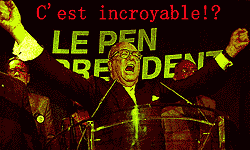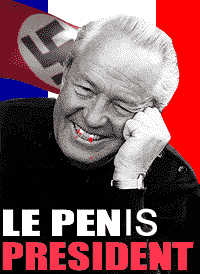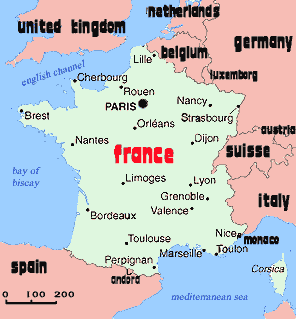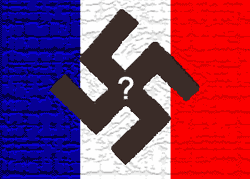|
from 03 march 2002 blue vol II, #23 |
|
|||
|
Nationalism, Anti-europeanism, or Anti-globalization? by Anne Ruimy
The day after the elections, the French newspapers scrambled to find strong enough words to describe the shock caused by the electoral results in the national, European and international political world. The result was not only unexpected - opinion pollsters never envisaged that the second round would be anything else than a Jospin-Chirac duel - it was also largely unpredictable, as it didnít follow trends set by previous elections. For the first time in the history of the republic, the far right has become the second political force in the country, while for the last three years internal squabbles had seemed to condemn the National Front to stagnation or even electoral decline. Not since 1969 had the left failed to reach the second round of the presidential elections.
What also marks the French electoral result is the fact that political commentators have given prominence to the "protest vote" theory rather than to rising support for the traditional anti-immigrant and insecurity themes of the National Front. The election was characterized by rejection.
A protest vote then. But protest against what?
Political analysts have generally not strayed too far beyond explaining that the electoral protest was aimed at the generalized corruption in the political class. Panic vote also in the face of insecurity, factory closures, delocalizations and globalization. Protest vote against the European process at the root of immigration, job losses and violence. But analysts have generally not made the link between this protest vote and the other protests, the anti-globalization protests that have gone from strength to strength in the streets of cities around the world recently. Interestingly, the latest protests took place during the Barcelona summit of European Union leaders last March. Anti-globalization protesters were expressing their frustration at the ultra-liberal direction taken by European Union - the main subject of discussions at the summit being liberalization of energy markets - and the lack of transparency and accountability of the decision-making process. What the protesters were in effect saying was that it didnít matter anymore which way they voted during forthcoming elections, when important decisions were taken undemocratically, in secret, and according to the agenda of big corporations.
Le Pen is not ignorant of the true aspirations of the people either: "You the excluded, the steelworkers, the workers of all those industries ruined by the Euro-globalization of Maastricht, you the farmers forced into ruin, you the first victims of crime in the suburbs and the cities," he addressed his supporters as the results came in. He then announced that he would take France out of the eurozone if elected.
In fact the scale of the shock to the political system created by the French election results is somewhat reminiscent of the shock created by the rejection of the Nice Treaty in the Irish referendum of June 2001. There again, a motley crew of voters rejected a certain idea of Europe, mere days before large-scale anti-globalization protests in Gothenburg, where a summit of EU leaders was taking place... Thus the French protest vote, directed against pro-European parties, appears to be as much a protest against the parliamentary democratic system, or rather what is left of it after decades of it being undermined by the forces of globalization, than a protest against the corrupted political class. So if the French vote is inscribed within any trend, it is more a trend of rising anti-globalization than rising neo-nazi sentiment across Europe and the world.
Thus, that the marginals and working class would see in a Le Pen-led government a solution to any of their problems is hard to comprehend for the uninitiated. One explanation could be found however in this fact that the National Front, as unacceptable as it is to the mainstream, does have something that the anti-globalization movement doesnít have: links to influential people in business and politics. The mainstream media may be shouting cries of shock and disgust at the electoral results, but they have generally failed to clearly distinguish between the violence (directed against property) of the radical fringes of the anti-globalization movement and the violence (directed against persons) of the para-military elements of the far right. The mass media companies, profit-seeking corporations dependent on business advertisers, will not publish what is in their interests to remain secret. Without being patronizing to the un-educated lower classes, the fact that they may have been misguided into voting for a wealthy Le Pen could be explained in part by the fact that no credible alternative is presented to the current crisis of the democratic process outside of fascism.
All parliamentary democratic systems are essentially the same depending on how votes are cast, proportional representation or "first past the post." Only if meaningful choices are offered to voters, in terms of at least one candidate capable of leading a government while also having inspiring politics, will a sufficient level of consensus emerge. But there are alternatives, and democratic ones at that.
The anti-globalization movement is starting to move beyond the stage of protesting to thinking of possible solutions. One of the slogans of the movement is "another world is possible". So what would this other world look like? The system some of its members promote is anarchism, which unlike its presentation in the media is not synonymous to chaos. Politically, it would function as a non-hierarchical system, where all decisions are made at a grassroots level. But the movement has yet to devise and agree on practical ways of implementing such a system, and the reflection, discussions and arguments are only starting. An open letter from the French "sans-titre informal affinity network of groups and individuals" questions the movementís attempts at self-organizing through e-mails and meetings:
Meanwhile, such forms of participatory democracy have started to get tested in real life, in countries that have experienced severe political and economical crises . The neighborhood assemblies that have mushroomed throughout the capital of Argentina since the December protests and rioting that toppled two presidents within the space of two weeks have achieved some concrete results. The assemblies' projects range from a community vegetable garden to a neighborhood bank in which people can put their savings in order to keep them out of the financial system, where strict limits on cash withdrawals were imposed by the government in early December to prevent a run on banks.
But if anarchism is in unpalatable to the political class and even to most European citizens, there are simpler and more conventional solutions. If the political system was to be altered rather than overthrown, the French could look no further than Switzerland for its system, which is based on a communal grassroots vote rising to cantonal level and then to the parliament. Even simpler: parliamentary democracy ŗ la franÁaise has after all proved successful for many centuries, before globalization made a farce of it. After the French vote, politicians and the media have cried out against voter apathy, but voters donít become apathetic for no reason. If the mainstream political class wants to stay in power, it should listen to the people protesting with their feet, and with their votes. Firstly, it needs to restore democracy, meaning that the power to decide is taken back from the WTO, the G8, the Summits of European leaders, where it shouldnít be in the first place. Secondly, it needs to clean up its act and make a real effort to end corruption and catering for the interests of big businesses. Of course, these two points are inextricably linked.
The establishment should listen to this and other warnings. If order is restored after the current political crisis, other political and economical crises will necessarily follow. The continuation of "business as usual" will necessarily result, sooner or later, in a serious popular attempt to overthrow the system. And there is no way of telling what would come out of this: a form of anarchy, or a form of fascism? Take your pick.
|
|||||||||


 And now France: Jean-Marie Le Pen, the president of the National Front, obtained 16.95 % of votes in the first round of the presidential elections and will stand against Jacques Chirac (right, current president, 19.71%) in the second round, eliminating Lionel Jospin (left, 16.12%). Le Penís success seems to fit in a trend of rising far right across Europe. But what marks the latest electoral success of the National Front is not the continuation of a trend but rather a discontinuity.
And now France: Jean-Marie Le Pen, the president of the National Front, obtained 16.95 % of votes in the first round of the presidential elections and will stand against Jacques Chirac (right, current president, 19.71%) in the second round, eliminating Lionel Jospin (left, 16.12%). Le Penís success seems to fit in a trend of rising far right across Europe. But what marks the latest electoral success of the National Front is not the continuation of a trend but rather a discontinuity.
 The parties outside the system have proved more in tune with the people - working class and marginals in particular - than the governmental parties. In her last public meeting before the first round of the elections, the trotskyist candidate Arlette Laguiller said: "Despite what the commentators are saying, itís the first round that counts, because thatís when electors can truly express their opinion and tell those who govern them what they think of their politics. After that, the dices will be loaded. It will not be possible to do something useful of the ballot papers. And the problem of the first round is to know if we are going to approve the two men [Jospin and Chirac] who have governed this country together for the last five years and who, in different words, propose the same politics. To vote for one of them, anyone, would mean to approve the voluntary impotence of the political power to oppose mass layoffs, unemployment, rising poverty, thousands of families made homeless, the decline in health services and the despair of youths who see no future."
The parties outside the system have proved more in tune with the people - working class and marginals in particular - than the governmental parties. In her last public meeting before the first round of the elections, the trotskyist candidate Arlette Laguiller said: "Despite what the commentators are saying, itís the first round that counts, because thatís when electors can truly express their opinion and tell those who govern them what they think of their politics. After that, the dices will be loaded. It will not be possible to do something useful of the ballot papers. And the problem of the first round is to know if we are going to approve the two men [Jospin and Chirac] who have governed this country together for the last five years and who, in different words, propose the same politics. To vote for one of them, anyone, would mean to approve the voluntary impotence of the political power to oppose mass layoffs, unemployment, rising poverty, thousands of families made homeless, the decline in health services and the despair of youths who see no future."
 We are at a crossroads, living an open, exciting but very dangerous period of history. The summer of 2001, with its deepening global economic crisis and strengthening public support for anti-globalization ideas, arguably marked the end of "modernism," and the ensuing American-led "war on terrorism" has been interpreted as a desperate attempt to restore the New World Order, which looks increasingly old-fashioned. But post-modernism could go either way: a form of authoritarianism, or something else that has basically been untested in the modern history of the western world.
We are at a crossroads, living an open, exciting but very dangerous period of history. The summer of 2001, with its deepening global economic crisis and strengthening public support for anti-globalization ideas, arguably marked the end of "modernism," and the ensuing American-led "war on terrorism" has been interpreted as a desperate attempt to restore the New World Order, which looks increasingly old-fashioned. But post-modernism could go either way: a form of authoritarianism, or something else that has basically been untested in the modern history of the western world.